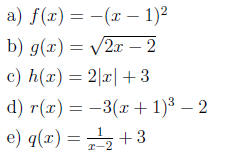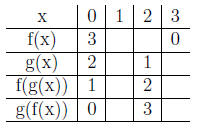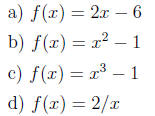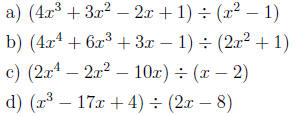Math 109 Exam II Review
1. Graph the following functions using transformations.

2. Find f + g, f − g, f*g, f/g, f(g(x)), and g(f(x)) for the following
functions and
determine the domain for each.

3. Fill in the table assuming f, g are 1-1 functions:

4. Find the inverse of the following functions if the function has one.

Part 2: Use the graphs of the above functions to graph the inverse function.
Use these
graphs to check your answers above.
5. What is the distance between the points (1, 2) and (−2, 3)?
6. Find the center and radius of the circle x2 + y2 − 4x + 6y − 12 = 0.
7. What is the vertex, axis of symmetry, maximum or minimum value, domain and
range
of the following quadratic functions?

8. You are fencing in your back yard, but you do not need to place a fence on
the right-hand
side (your neighbor already has a fence) or on half of the side with the house.
You have 180 feet of fence. What are the dimensions of the largest rectangular
yard
you can fence?
9. For the function f(x) = 2x2(x − 1)3(x + 2)
a) Determine the end behavior using the Leading
Coefficient Test.
b) Determine whether the graph has y-axis symmetry, origin symmetry, or neither.
c) Find the zeros and determine whether the graph touches or crosses the x-axis
at each zero.
d) Graph the function.
10. Divide

11. Use the Remainder Theorem to find f(9) for f(x) = 4x3 − 2x + 1
12. For the following functions, list all possible
rational roots, determine the possible number
of positive and negative real roots, use synthetic division to test the possible
roots,
find the remaining roots.

13. Find a fourth degree polynomial having roots 1, -3, 1-i and f(−1) = 6.
14. Graph the rational function including asymptotes and intercepts.

15. Solve the inequality.

16. An electric bill varies directly as the amount of
electricity used. The bill for 1400
kilowatts of electricity is $98. What is the bill for 2200 kilowatts of
electricity?
Also, you should be able to do word problems with these
concepts. Look at the review
exercises in the book and the chapter tests. Not every type of problem is on
this sheet; make
sure to review all of the material.




